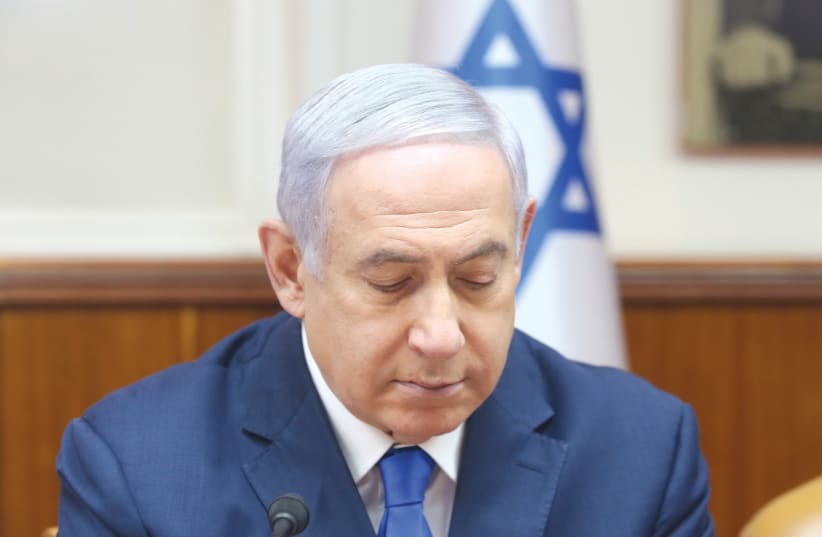Prime Minister Benjamin Netanyahu used foreign policy as major theme in the 2019 election campaign. Giant billboards depicted him standing alongside US President Donald Trump. His aides pointed to his diplomatic achievements, including US recognition of Jerusalem as Israel’s capital and the close ties he had forged with major world leaders.
Once the voting was over, Netanyahu posed for a photo-op with close Likud Party associates under a giant picture showing him meeting with Chinese President Xi Jinping. Ahead of the elections, the prime minister also scheduled a series of visits and events to highlight his position as an arch-diplomat. These included inauguration of a Hungarian trade office in Jerusalem, the supportive statement by Romania’s prime minister for moving its embassy to Jerusalem, Trump’s recognition of Israeli sovereignty over the Golan Heights – and a visit by the newly elected president of Brazil. Capping his activity was a meeting with Russian President Vladimir Putin in Moscow prior to the return of the remains of Zachary Baumel, an Israeli soldier killed in the 1982 Lebanon war.
Previous election campaigns did not accord the foreign policy achievements of Israeli leaders a particularly prominent position. Netanyahu’s focus on the foreign policy arena suggests, perhaps, that the prime minister felt that he enjoyed limited success on other issues, such as security and the economy. There may also be a personal explanation to the focus on foreign policy in the campaign: Netanyahu rose to prominence through diplomacy, serving as Israel’s deputy chief of mission in the US, Israeli ambassador to the UN and deputy foreign minister. Moreover, his approach echoes the diplomatic style of his biological and political forefathers – the Revisionist movement in pre-state times. The movement stressed grandiose public gestures, contacts and understandings with world leaders and dramatic speeches before international fora. The prime minister’s diplomatic flowering occurred simultaneously with the weakening of Israel’s Foreign Ministry during his tenure. Netanyahu greatly contributed to this weakening, refusing to appoint a full-time foreign minister and withholding support for the diplomats’ pay demands despite the strike they waged.
Netanyahu thus positioned himself as “a king-diplomat,” (a term coined by Prof. Piki Ish-Shalom at the Hebrew University in Jerusalem): a leader who controls the daily diplomatic agenda while bypassing the professionals and government bureaucracy. On the eve of Election Day, Netanyahu even boasted that Trump “gave” him the Golan Heights, as if it were a deal between two individuals rather than a diplomatic move between states. Netanyahu joins the global populist wave with a particular emphasis of his own – on the foreign relations angle.
WHAT ARE the implications of this style and its success in the elections?
First, assuming that Netanyahu believes his image as an arch-diplomat helped him in the elections, we are likely to witness continued diplomatic activity on his part. In the coming months, Netanyahu will be launching the fight of his life in the face of three possible indictments on corruption charges, and possibly an additional police inquiry into the affair involving Israel’s purchase of submarines from Germany and money that Netanyahu received from his American cousin. All of the above could not only end his political career, they could land him in jail. Under these circumstances, Netanyahu is likely to make an effort to boost his public image as an arch-diplomat whose incumbency is essential for the State of Israel, even at the cost of slowing, delaying or halting the legal proceedings against him.
Netanyahu appears to have already made use of this argument in the past, albeit de facto (rather than by declaration). On March 6, 2017, during questioning by investigators of the anti-corruption police unit Lahav 433 at his official residence, Netanyahu suddenly received a call from the US president. The questioning was suspended so he could take the call, which reportedly focused on the threat from Iran. The call was presumably timed to coincide with the police questioning. Even if it was not, the message was clear: Netanyahu is essential for Israel’s foreign relations, and entrusting him with the state’s most important issues even justifies a halt to the legal proceedings against him.
Second, the current conditions in the international arena are ripe for moves that fit into Netanyahu’s agenda. Such moves could include, first and foremost, possible annexation of parts of the West Bank. The US under President Trump is less and less committed to the international liberal order. The rising power in the East – China – is committed to some aspects of the existing international order, but probably not to its liberal aspects. As a result, the post-1945 norm against annexation of occupied lands is gradually eroding. The Arab world, which opposes Israeli annexation, is weak and busy with crises in various states. Europe, which voiced opposition to annexation, is torn on other, more pressing issues.
Annexation has costs. Annexing territories without granting the Palestinians basic rights will deepen the rift between Israel and significant parts of US Jewry that views political and civil equality as a fundamental feature of just political systems. Even a more limited annexation, only of the settlement blocs, is likely to increase these tensions, albeit to a lesser degree. Such measures would have a domestic cost, too. A significant number of Israelis oppose annexation, in part, as Jews might no longer be the clear majority in the boundaries of this new “greater Israel.”
Finally, even in an era of “monarchic diplomacy” with Netanyahu as its focal point, the experience and continuity provided by professional civil servants at the Foreign ministry is of invaluable importance. Israel’s national interest lies in bolstering the Foreign Ministry, not weakening it. Israel’s next foreign minister should be willing to stand up to the continued undermining of the ministry.
The writer is a board member at Mitvim–The Israeli Institute for Regional Foreign Policies, and a senior lecturer on international relations at the University of Haifa School of Political Science.
